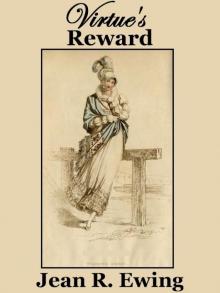- Home
- Jean R. Ewing
Scandal's Reward
Scandal's Reward Read online
SCANDAL’S REWARD
Jean R. Ewing
“Reputation is an idle and most false imposition;
oft got without merit, and lost without deserving.”
—Othello
Chapter 1
“Oh, Cathy, you shall not do it! I could never forgive myself if I thought that my sister had sacrificed herself for my sake. Mama, say that Cathy shall not do it!”
Mrs. Hunter sat with composure at her needlework beside the small vicarage fire. She cast a shrewd glance at her two eldest daughters. Catherine was calmly folding and putting away her harpsichord music, while Amelia, who had been helping her, now stood hem deep in the pages that had just dropped from her fingers.
Yet Catherine only laughed. “Pray, do not be such a pea goose, Amelia! I am not, like Iphigenia, about to be immolated. On the contrary, Lady Montagu has the most beautiful pianoforte, and I am to be treated quite as one of the family. I intend to enjoy the post, and if the alternative is marriage with Mr. Crucible, then I assure you that my mind is quite made up.”
“But to become a paid companion! If Captain Morris had not come to speak to Papa for my hand, I know you would not have done it.”
Neither of the girls was dressed in the first stare of fashion, but Amelia’s ivory muslin set off her golden beauty, while Catherine had so much natural grace she looked elegant even in her simple green jaconet. Their mother’s glance was full of affection for them both.
Of course it would have been preferable for Catherine, as the eldest, to marry first, but Mrs. Hunter was afraid her daughter’s bold sense of independence was not what the young men of the neighborhood usually found attractive. When Catherine, in spite of a complete lack of encouragement on her part, had mysteriously gained the attentions of the impossible Mr. Crucible and that gentleman had insisted on making her an offer, the entire family had found it a wonderful joke.
She wondered now, however, if Catherine’s pride had not been rather wounded, after all: that she could elicit no better offer, when Amelia had been able to win the heart of someone as eligible as Captain Morris. If taking a post as companion to Lady Montagu would help Catherine to forget the humiliation, then it was all to the good.
“You display an excess of sensibility, Amelia.” Mrs. Hunter kept her voice as calm and rational as always. “Catherine knows perfectly well that she is under no obligation to accept either this post or Mr. Crucible’s offer, and may stay quietly at home here with us. It is all her own idea to leave before your wedding, but Reverend Hunter and I have no objection. Lion Court is, after all, the most prominent place in this part of Exmoor and it’s the property of Lady Montagu’s father—even though he lives in Bath—and he is the Marquis of Somerdale. For Miss Hunter to take a post with Lady Montagu now that she is widowed is quite unexceptionable.”
“Come, Amelia.” Catherine linked her arm affectionately with her sister’s. “It isn’t a three-act tragedy. As daughters of a country parson, none of us may be independent, you know. Unfortunately, we have not all been endowed with your ravishing blond curls and blue eyes, so that we may attract the attentions of such handsome young gentlemen as your Captain Morris. I know you would rather I was married first, but if Mr. Crucible represents the kind of offer I am likely to receive, David Morris would pine away to a shade waiting for the nuptials. I am two-and-twenty, Amy, positively on the shelf. I do not, however, intend to age sadly in my father’s parlor like some worn-out overstuffed cushion, there for occasional support, but neither really decorative nor useful.”
“How can you speak such fustian? I know you are teasing me,” persisted Amelia, for whom life could hold no other possible attractions at the present than immediate matrimony. “Mr. Crucible is not what anyone would wish, of course, but there are other gentlemen. You have the finest eyes in the world, and Nurse always said you had the best bone structure of any of us, the kind that would last.”
“So I shall become a handsome old lady!” Catherine laughed, entirely without rancor. “I also have the dullest brown hair, not a single rosebud in my cheek, and am quite three inches too tall. I shall make a most seemly lady’s companion and Lion Court will suit me very well. Lady Montagu may even go to London and you know how I have longed to travel. So your concerns are entirely misplaced, and even with both of us gone, Mama will still have four daughters on her hands.”
Amelia was not to be so easily persuaded. She turned her limpid blue eyes on her father who sat opposite his wife at the modest basket fireplace. He had already lifted his head from the book which lay in his lap. “Can you truly like it, Papa? Was there not some dreadful scandal at Lion Court some years ago?”
“Catherine shall do as she thinks best, pet. Nothing that occurred then at Lion Court can possibly affect her taking a post as companion to Lady Montagu.”
And that was too much for twelve-year-old Annabella Hunter, who had been sitting in a concentrated silence throughout the previous conversation. It was an unusual state for Annie, but the evening was drawing in to that point where, unless she remained unnoticed, she would be sent upstairs to join her three little sisters, presumably snugly abed and long since asleep. She didn’t mean to listen where it was none of her business, but if both Catherine and Amelia were to leave home, then she might be able to have their bedroom and not have to share with the little ones in the nursery any longer. She had also been trying quite hard to remember who Iphigenia was—she was sure it had something to do with the Trojan War and Agamemnon, and that a goddess had rescued her before she was actually sacrificed—when she heard reference to the old scandal.
Her eyes opened wide. “It was about Devil Dagonet, wasn’t it?” Annie asked, her plan of silence forgotten, and then blushed painfully as four pairs of eyes turned in her direction.
“Charles de Dagonet has been gone from Lion Court for seven years,” her father said sternly, “at which time you were five years old. Pray, miss, what can you know of the matter?”
Annie was scarlet but she defiantly stuck out her chin. “I heard Cook and Polly talking one day. They said he was wilder than Beelzebub, and could kill a man with his sword, and played sailors’ songs on the organ, and he jumped his horse through the church lych-gate for a wager. But his grandfather cut him off without a penny, because he drowned a maidservant in the Lion Court Lake and he held her under until she turned blue. And Polly said that still he was an awful dashing young gentleman and had tons of lovers.”
“Miss Annabella Hunter! You will apologize to your mother and sisters. Go to bed this instant!”
Annie, her face a flag of embarrassment, mumbled something inaudible and charged from the room.
Mrs. Hunter swallowed her smile and tried to look serious. “I shall have to talk to Cook, Reverend Hunter. How could she be so careless in front of the child? Of course the circumstances of the drowning were the on dit of the time, but to think that the servants should still talk of it and fill Annie’s head with such nonsense!”
Catherine moved from the harpsichord where she had earlier been playing to sit beside her father. “Devil Dagonet! To think that I am to live in the household which produced such a famous reprobate! Of course neither Amy nor I ever met him, but I do remember some infamous tales of his exploits.”
“It was very shocking.” Mrs. Hunter had seen enough of the ways of the world in her time as a country parson’s wife to take a great deal in her stride, yet she still felt considerable disquiet about this. “He became quite the black sheep of the family. He was half French, of course, even if he was born and raised at Lion Court.” Her tone implied a certain disapproval of anyone with a French father, however blue the blood on both sides. “Yet it seemed to me there was no real harm in him, just high spirits, and he was, after all, an or
phan.”
“How old was he when that happened, Mama?”
“Let me see now, he must have been about ten years old when his parents were killed and the marquis had Sir Henry Montagu move into Lion Court and become his guardian. Lady Montagu and Dagonet’s mother were sisters, you see; the marquis has no sons. They began calling him Devil Dagonet shortly after that. He had a ruthless charm even as a boy. It must have been very hard for him to have his uncle’s family take over Lion Court, and feel displaced in his own home by his cousin. Yet I’m afraid Dagonet would always put Sir Henry’s own son, George, in the shade. The boys were the same age, but Charles was his grandfather’s favorite. It was always expected that Lord Somerdale would deed Lion Court to him when he came of age.”
“Then it’s not part of an entail?”
Mrs. Hunter shook her head. “Though most of the rest of Lord Somerdale’s estates—and the title, of course—will pass to a nephew, Lion Court is free for the marquis to bequeath as he wishes. Not surprisingly, I believe Sir Henry was rather rough on the lad. At any rate, Charles de Dagonet ran wild.”
“He did jump a horse through the lych-gate, didn’t he?” Amelia asked.
The lych-gate at the Fernbridge church was a famous historic landmark. It was a funny little structure with a low thatched roof supported by four carved pillars at the entry to the churchyard. The pillars were surrounded by a stone wall with a wooden gate at the front and back. How anyone could jump a horse through such a tight space, Catherine had no idea.
“Yes, and it set the parish all by the ears.” Mrs. Hunter gave a wry smile. “It was two years after Trafalgar. You must have been fifteen years old, Catherine, which, now I come to think about it, was the same age as poor Millicent Trumble, the girl that was drowned. Charles de Dagonet and his cousin George Montagu were both down from Oxford for the summer. George’s sister, Charlotte, and her husband, Mr. Clay, were also staying at Lion Court earlier that year. Devil Dagonet was a fearless horseman. I think he would have taken any wager. His father was the Comte de Dagonet, you know. No doubt Dagonet shared the usual faults of his class!”
“No wonder,” Catherine commented dryly. “With Sir Henry Montagu as his guardian. Don’t you recall, Amy, how Sir Henry caught us trespassing in Rye Water as little girls? I thought he would take his horsewhip to us.”
“That’s as may be,” their mother said. “Sir Henry was a hard man and young Dagonet seemed to take delight in defying him. It went too far when one of the maidservants was involved in his adventures and she was found drowned.”
“And he was thought to have killed her?” Catherine asked.
“Nothing could be proved,” her father said. “The circumstances of the drowning were rather a mystery.”
“But there was a great deal of talk,” Mrs. Hunter continued, “and either way Dagonet was seen to be responsible for Millicent Trumble’s death. There was the most dreadful family scene. Lord Somerdale came down from Bath and young Dagonet was shown the door. The marquis changed his will, then and there, in favor of George, and Charles was completely disinherited. He couldn’t stay in England after that and he went for a soldier.”
“How responsible? Perhaps she drowned herself in a fit of remorse,” Amelia said, her blue eyes shining. “Did the dashing Dagonet entice her into holding up carriages after dark or into stealing the family silver?”
“Oh no, she was an honest girl in that way, I’m sure. That was not the kind of trouble laid at Dagonet’s door. No, poor Millicent was with child.”
At which point Catherine wondered how on earth that interesting fact could have been kept from her all these years. Even though she and Amy had been away at the Young Ladies’ Seminary in Exeter, she remembered the time of the drowning quite clearly. Her father had insisted on burying the girl in hallowed ground, which he could never have done if she had been a suicide. Surprisingly the Montagus had agreed, though it was almost as good in the eyes of the parish as admitting that they thought their own nephew had committed murder as well as ravishment.
“As I remember, Sir Henry Montagu was an extremely unpleasant, florid-faced man with a loud voice,” Amelia said.
“Yet it was seen as a great act of charity when he moved his family into Lion Court to take care of the orphaned Charles de Dagonet, even though, thanks to gaming debts, they arrived penniless.”
“So the revenues of the Lion Court estates saved them from Queer Street?” Amelia shrugged. “And from what I hear, the ancient marquis, owner of Lion Court and responsible for the arrival of the Montagus, is nothing but an irascible old man and best avoided.”
Catherine laughed. Certainly, Percival Blythe, Marquis of Somerdale, could never have approved of either daughter’s marriage: the younger to a financially ruined but otherwise impeccable sprig of the Montagu family, and the elder to a French count who lost everything in the Revolution when his son Charles was a small boy, and then managed to kill both himself and his wife in a carriage accident some years later.
The entire family, she supposed, had always been dependent on the old man’s good will. Yet it was Charles, his favorite, who had been the one to irrevocably destroy it. He may have turned out to be the black sheep, but still Catherine did not envy the wicked and fearless Charles de Dagonet his relations.
Well, she didn’t see how any of it could possibly affect her. Devil Dagonet was not expected to show his face on Exmoor again. His cousin, now Sir George Montagu, lived in London, as did the widowed sister, Charlotte—Mr. Clay had died soon after Dagonet had left England. Their father, Sir Henry Montagu, had collapsed of the apoplexy just the previous winter leaving Lady Montagu a widow, alone at Lion Court. And so she had approached Catherine one Sunday after church to offer her the post of companion.
Lady Montagu was certainly a little pathetic, but only lonely and vulnerable. The arrangement seemed acceptable, and—as Catherine had never tried to hide—very preferable to Mr. Crucible’s absurd and unwelcome attentions. But as she had not admitted to Amelia, it was indeed her sister’s impending marriage to Captain David Morris that had led her finally to accept the post. Her pride alone forbade her from staying on at home. Besides, Annie was growing up, the vicarage was small, and at twenty-two the eldest should move out to make room for her little sisters.
Mrs. Hunter rose to her feet. “Well, I shall go up to poor Annabella, she has probably cried enough by now.”
“Then I’ll come up with you, Mama.” Amelia kissed her father on his balding pate. “Captain Morris is to take me out in his curricle tomorrow and I must look my best.”
When they had gone, Catherine turned to her father. He seemed lost in thought.
“Sir Henry Montagu believed Millicent Trumble’s death was Dagonet’s fault, didn’t he? And the marquis? No wonder they flew up into the boughs and he was cast off by the family! I remember, when I was quite a little girl, you used to go up to Lion Court to tutor the cousins in their Latin and Greek. What manner of boy was this Charles de Dagonet? Did you think he would grow up to be capable of ruining a girl and then drowning her?”
The Reverend Hunter smiled at her. Catherine did not quite realize that he hadn’t really answered her when he said, “It was a great tragedy, my dear. Charles de Dagonet was a remarkable young man. He was capable of anything.”
Ten minutes later, Catherine was brushing out her hair, which now shone a deep russet brown in the candlelight. Her sister watched her across the little bedchamber that they shared. Amelia’s dimpled chin was resting on her folded arms, supported by her knees beneath the quilted cover of her bed.
“I wish I could have met him,” she said to her sister.
“Who?” Catherine was not thinking about the conversation they had exchanged downstairs, but about her father. Six daughters were a dreadful burden for a country vicar. She had definitely made the right decision. Indeed, she should have acted before, instead of waiting at home in the vain hope that a Prince Charming would turn up for her, as he had for Amelia.
“Amy! He sounds like a complete renegade. He was said to be quite ruthless.”
“But don’t you think it’s really the most romantic thing? That our own neighbor should grow up to be so profligate and be disinherited? Suppose he should come back to fight Sir George Montagu for Lion Court!”
Catherine laughed aloud. “Amy, we are living in the nineteenth century and this is England. I should not imagine that Devil Dagonet will ever come back to Exmoor. Anyway, it’s not in the least romantic. He must have been dreadful to earn such a name.”
“No, just the opposite, according to Polly.” Amelia’s blush wasn’t that different from her little sister Annie’s. “I asked her before I came up to bed. The country people and the servants all liked him. It was only because of his reputation with the ladies that they called him Devil Dagonet.”
“Well, it can hardly matter now what kind of a libertine he turned out to be.” Catherine slipped between her covers and blew out the candles. Her next remark was made to the sweet summer darkness that filled the air like a fluid. “I think we can be certain that none of us will ever have the misfortune to meet him.”
* * * *
Some days later, Catherine tied the strings of her chip bonnet firmly under her chin and, climbing up out of Fernbridge, headed for the moor. The morning sky shone bright and clear, and the heather-scented heights beckoned. It was the last day of August and her final day of freedom before she began what she firmly expected to be an extremely uneventful time at Lion Court. Within a couple of hours, she had reached the slopes of Stag Hill overlooking the entire Rye Water valley and the Lion Court estates.
There was one better vantage point on Eagle Beacon itself, but it was a steep scramble from where she was standing, through the swamps at the head of Rye Water. The track that led there was extremely hazardous unless you knew it well, which was why Catherine was so surprised to see that a horseman was cantering that way with careless abandon. He wore a serviceable dark coat over plain buckskin breeches; leather saddle bags and a sword case were strapped behind him. Since she had never seen such a magnificent gray Thoroughbred before, she knew that it must be a stranger. Unless he slowed his pace, he was putting both himself and his mount in considerable danger.

 Rogue's Reward
Rogue's Reward Scandal's Reward
Scandal's Reward Valor's Reward
Valor's Reward Folly's Reward
Folly's Reward Virtue's Reward
Virtue's Reward Love's Reward
Love's Reward